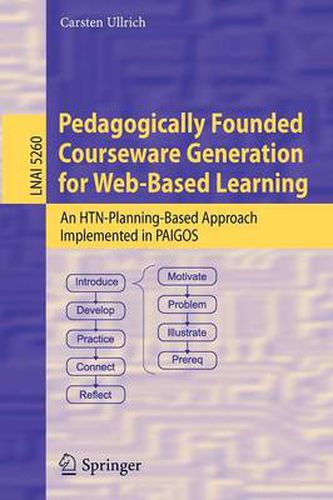Readings Newsletter
Become a Readings Member to make your shopping experience even easier.
Sign in or sign up for free!
You’re not far away from qualifying for FREE standard shipping within Australia
You’ve qualified for FREE standard shipping within Australia
The cart is loading…






This title is printed to order. This book may have been self-published. If so, we cannot guarantee the quality of the content. In the main most books will have gone through the editing process however some may not. We therefore suggest that you be aware of this before ordering this book. If in doubt check either the author or publisher’s details as we are unable to accept any returns unless they are faulty. Please contact us if you have any questions.
Automatic course generation is a very important area of research with numerous practical applications in e-learning. It has been studied since the 1980s within the fields of intelligent tutoring, AI and education, adaptive hypermedia and web-based educational systems. Many approaches have been proposed, but hardly any have resulted in generic and practically applied systems. A number of problems have remained unresolved. These problems are addressed by this work.
This book focuses on course generation based on Hierarchical Task Network planning (HTN planning). This course generation framework enables the formalization and application of complex and realistic pedagogical knowledge. The volume describes basic techniques for course generation, which are used to formalize seven different types of courses (for instance, introducing the learner to previously unknown concepts and supporting the learner during rehearsal) and several elementary learning goals (e.g., selecting an appropriate example or exercise). This framework has been implemented and evaluated with good results in several domains, with users from different countries and universities, in the context of an EU project.
Course generation based on HTN planning is implemented in PAIGOS and has been evaluated by technical, formative and summative evaluations.
$9.00 standard shipping within Australia
FREE standard shipping within Australia for orders over $100.00
Express & International shipping calculated at checkout
This title is printed to order. This book may have been self-published. If so, we cannot guarantee the quality of the content. In the main most books will have gone through the editing process however some may not. We therefore suggest that you be aware of this before ordering this book. If in doubt check either the author or publisher’s details as we are unable to accept any returns unless they are faulty. Please contact us if you have any questions.
Automatic course generation is a very important area of research with numerous practical applications in e-learning. It has been studied since the 1980s within the fields of intelligent tutoring, AI and education, adaptive hypermedia and web-based educational systems. Many approaches have been proposed, but hardly any have resulted in generic and practically applied systems. A number of problems have remained unresolved. These problems are addressed by this work.
This book focuses on course generation based on Hierarchical Task Network planning (HTN planning). This course generation framework enables the formalization and application of complex and realistic pedagogical knowledge. The volume describes basic techniques for course generation, which are used to formalize seven different types of courses (for instance, introducing the learner to previously unknown concepts and supporting the learner during rehearsal) and several elementary learning goals (e.g., selecting an appropriate example or exercise). This framework has been implemented and evaluated with good results in several domains, with users from different countries and universities, in the context of an EU project.
Course generation based on HTN planning is implemented in PAIGOS and has been evaluated by technical, formative and summative evaluations.